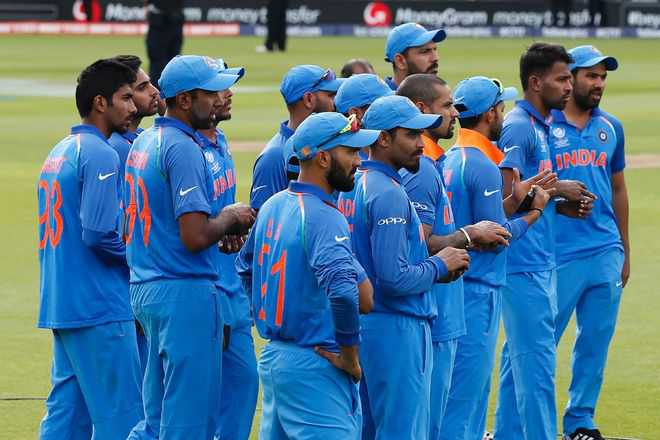Rohit Mahajan
Tribune News Service
London, June 19
Where did India go wrong?
That's easy for armchair analysts — they should have batted first, all of them say. If India had won after chasing down 338, the same people would have said that Virat Kohli was right to bowl first after winning the toss. It's easy to be wise after the event. Kohli chose to bowl first because he backed his team's ability to chase down anything. His own batting average in India's wins while chasing is a phenomenal 95.20 — which means that every time India won a match batting second, Kohli got five short of 100.
Kohli had to come in in the first over — only the third time he was doing so as the team's No. 3. The previous two innings, he'd got a 100, to take India to victory — 118 against Australia at Visakhapatnam in 2010, and 183 against Pakistan in Dhaka in the Asia Cup in 2012. India were chasing 290 vs Australia and 330 vs Pakistan. Both times Kohli's role was pivotal in India's wins. In India's chases in the previous two matches here, Kohli had made 76 not out and 96 not out.
Pak pace
In India's group stage loss to Sri Lanka, in which India batted first, Kohli had made only 0 on a very flat Oval wicket. Yesterday, Kohli was confronting a much better bowling attack, which was really fired up after their batsmen had put up a very stiff target for India. Scoreboard pressure made Rohit Sharma play at a ball he usually leaves alone at the start of the innings, and then he got a brilliant ball from Mohammad Amir.
Kohli came in and was beaten first ball by Amir's trademark angled one, bowled at 90 mph; Amir varied his pace, Kohli got a few runs over the next few balls, before Amir beat him with angle once again on the third ball of the third over. A catch lobbed up to Azhar Ali at first slip, but he dropped it. Despair for Pakistan. Relief for India — maybe a decisive drop? Perish the thought, for next ball, Kohli's bat's leading edge made the ball fly to Shadab Khan at point. Match over, more or less.
Bad feeling
“It's always a bad feeling when you get out or the batting doesn't work collectively, and everyone feels bad about not having contributed to the team in any way,” Kohli later said. “So yeah, I also felt the same kind of emotions, but you know, you've played enough to understand that your job is done, you tried your best, and then you can't control anything afterwards.” He said something else that was very significant, something the most ardent fans forget: “You know, they also have come to win a game of cricket.”
Both teams try to win. No win is guaranteed. Sportspersons know it best, and fans and media must learn this.
Batting first?
That said, should India really have batted first in this game for one simple reason — this was the final, and scoreboard pressure can crush the chase. We've seen this happen to India in the past in big games — in the 1996 World Cup semifinals against Sri Lanka, in the 2003 World Cup final against Australia, for instance. India's bowling was rendered toothless for the second time at the Oval ground by India's neighbours — Sri Lanka hunted down India's 321 on June 8 with absolute ease. There seemed no way India's bowlers would get a wicket. Four wickets fell, and two of them were run-outs. The flat track turned India's acclaimed bowling line-up completely ineffective that day.
The same happened in the final. Fakhar Zaman got lucky, and he continued to go for his shots. There seemed no way that India's bowlers would get a wicket. Bhuvneshwar Kumar was the most economical bowler, giving away runs at 4.4 an over. Ravichandran Ashwin, Ravindra Jadeja and Hardik Pandya were taken for 164 runs in 21 overs, at close to eight an over. The flat wicket, blistering heat and swing-unfriendly conditions made it a heaven for the batsmen.
But when India batted, scoreboard pressure told on the batsmen. Pakistan bowled brilliantly. The predicted non-contest for an India win turned into a non-contest win for the predictably unpredictable Pakistanis.
Sarfraz named captain of ICC Team of Champions Trophy
London: Three Indians, including skipper Virat Kohli, were named in the ICC Team of the Champions Trophy 2017, with Pakistan's Sarfraz Ahmed named its captain, a day after his side's triumphant campaign.
ICC Team of the ICC Champions Trophy 2017 (in batting order) is: Shikhar Dhawan (India), Fakhar Zaman (Pakistan), Tamim Iqbal (Bangladesh), Virat Kohli (India), Joe Root (England), Ben Stokes (England), Sarfraz Ahmed (Pakistan), Adil Rashid (England), Junaid Khan (Pakistan), Bhuvneshwar Kumar (India), Hassan Ali (Pakistan), Kane Williamson (New Zealand (12th).
Unlock Exclusive Insights with The Tribune Premium
Take your experience further with Premium access.
Thought-provoking Opinions, Expert Analysis, In-depth Insights and other Member Only Benefits
Already a Member? Sign In Now










